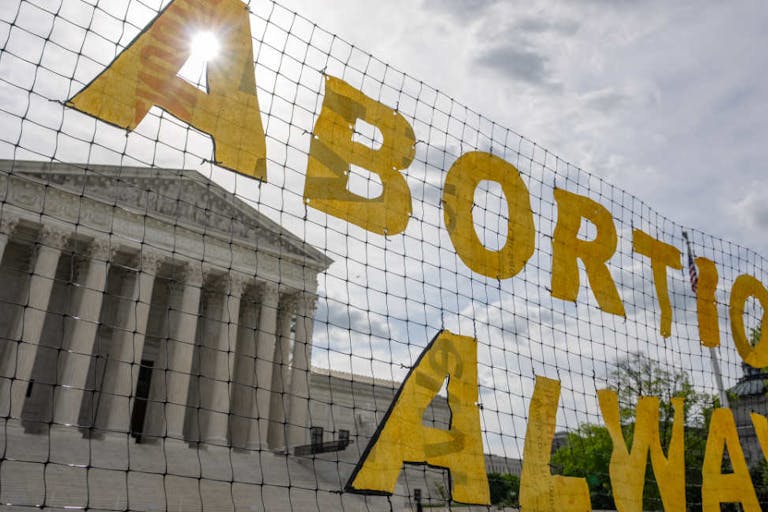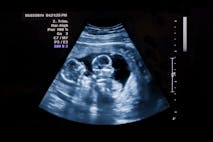
A growing number of Americans call themselves ‘pro-choice’ – but what’s really behind it?
Nancy Flanders
·
Texas women blame pro-life law for delayed ectopic pregnancy treatment. But is it at fault?
Two Texas women have filed complaints against two Texas hospitals, claiming they were denied timely health care for ectopic pregnancies due to the state’s pro-life law protecting preborn children from abortion. While it appears the women failed to receive timely, appropriate health care, there is no proof that it was because of the pro-life law as they and the media claim. In fact, failure to accurately diagnosis an ectopic pregnancy is unfortunately common.
Similar lawsuits have been carried out against doctors in New York and California — pro-abortion states — and attorneys in both of those states have discussed handling numerous cases like these.
According to research published by American Family Physician, between 40% and 50% of ectopic pregnancies are misdiagnosed at the initial visit to an emergency room, due largely to a failure to identify risk factors. Despite attempting to blame pro-life laws, the Associated Press admitted in a recent article, “Conclusively diagnosing an ectopic pregnancy can be difficult. Doctors cannot always find the pregnancy’s location on an ultrasound, three doctors consulted for this article explained. Hormone levels, bleeding, a positive pregnancy test and an ultrasound of an empty uterus all indicate an ectopic pregnancy.” According to research, only about 50% of women with an ectopic pregnancy will present with all symptoms of an ectopic pregnancy.
Because there is sometimes no heartbeat, the embryo can’t easily be located in the fallopian tube. (Research shows that in some cases, the preborn child in an ectopic pregnancy is not able to develop properly, and may not have a heartbeat). Treatment that ends a pregnancy can be carried out at any stage of pregnancy if there is no cardiac activity.
“You can’t be 100% — that’s the tricky part,” Kate Arnold, an OB/GYN in Washington, said. “They’re literally time bombs. It’s a pregnancy growing in this thing [fallopian tube] that can only grow so much.”
Kyleigh Thurman and Kelsie Norris-De La Cruz say their respective hospitals broke the federal Emergency Medical Treatment and Labor Act (EMTALA) which states that hospitals must provide treatment to stabilize patients during medical emergencies. In 2022, the Biden administration said that, under EMTALA, abortion is a stabilizing treatment for pregnant women facing an emergency diagnosis. Treating an ectopic pregnancy does not qualify as an induced abortion under any state law, including in Texas, and is completely legal.
There is a difference, in that induced abortion — the direct and intentional killing of a preborn child — is not necessary even when a pregnancy must end to save a woman’s life or health and is not considered stabilizing care.

Texas’ SB 8, also called the Texas Heartbeat Act, protects preborn children from abortion once an embryonic heartbeat is detectable, usually at about six weeks, though the heart first begins beating around 22 days post-fertilization. There is an “exception for medical emergency” section of the law, which states that abortion is not prohibited “if a physician believes a medical emergency exists that prevents compliance…”
Additionally, the Texas Health and Safety Code states, “An act is not an abortion if the act is done with the intent to: … remove an ectopic pregnancy.”
Even Planned Parenthood and other abortion businesses know that treatment for an ectopic pregnancy is not an abortion and is not prohibited by Texas law.
June Gupta, a women’s health nurse practitioner and senior director of medical services at Planned Parenthood Federation of America told US News in 2023 that with an ectopic pregnancy, “[t]here’s no choice.” She continued, “You’re not ending your pregnancy voluntarily. You’re doing something to save your life — otherwise both of you would die. This is not the same as a termination.”
In addition, Norris-De La Cruz’s complaint states that an abortion facility in New Mexico explained to her mother that “management of an ectopic pregnancy is not illegal in Texas.”
Thurman’s complaint said that she visited Ascension Seton Williamson Hospital in February 2023, where she was told she was miscarrying, and to “let nature take its course.” She was discharged, but returned to the hospital a second time “days later” with continued bleeding. She was “denied care even though her OB/GYN had concluded she had an ectopic pregnancy, and an attending hospital physician concluded her symptoms were those of an ectopic pregnancy.”
The complaint states that it wasn’t until Thurman’s OB/GYN “pleaded to hospital staff that she be given care that the hospital provided the necessary care.”
Article continues below
Dear Reader,
In 2026, Live Action is heading straight where the battle is fiercest: college campuses.
We have a bold initiative to establish 100 Live Action campus chapters within the next year, and your partnership will make it a success!
Your support today will help train and equip young leaders, bring Live Action’s educational content into academic environments, host on-campus events and debates, and empower students to challenge the pro-abortion status quo with truth and compassion.
Invest in pro-life grassroots outreach and cultural formation with your QUADRUPLED year-end gift!
Early ectopic pregnancy is often treated with an injection of methotrexate, a drug that stops the embryo from growing any further than it has, and it ultimately dissolves. Too much time had passed in Thurman’s case to administer methotrexate, as her fallopian tube had already ruptured, which can be deadly. She required surgery to remove the fallopian tube. At first, she balked, reported the Associated Press, because it would mean her fertility would be diminished.
The complaint blamed Texas’ pro-life law and the overturning of Roe v. Wade for the delay in care that Thurman received. However, it appears that Thurman was denied care initially due to a misdiagnosis of a miscarriage. If indeed doctors failed to treat the ectopic pregnancy after it was finally diagnosed, this should be considered medical neglect — which is not the fault of the pro-life law, which again specifically states that treating ectopic pregnancy is not an abortion.
According to the complaint filed by Norris-De La Cruz, she began experiencing cramping, bleeding, and discolored discharge, and went to the emergency room at Medical City Healthcare. Blood work indicated a low count of the pregnancy hormone human chorionic gonadotropin (hCG), and doctors told her she was possibly miscarrying. She was advised to return in two days for another blood test, which she did. Blood work showed that her hCG had dropped further, and she was told she had a “failed early pregnancy,” but might also have an ectopic pregnancy.
She was told she may miscarry on her own, but should seek medical care if she continued to experience cramping and bleeding.
Several weeks went by, and she continued bleeding; then, she began having “severe cramps.” The complaint states, “Sometimes the pain was so intense she struggled to stand…”
She began passing blood clots, but did not return to the emergency room, and instead made an appointment at her college’s health center. At the health center, she was told to go to Texas Health Arlington, where staff drew blood and performed an ultrasound. Her hCG had increased, but a mass was found; the complaint does not indicate where it was located. It did state that the doctor was “unable to find an intrauterine or extrauterine gestational sac.” Staff wrote in her chart: “Ectopic pregnancy remains a consideration until proven otherwise.”
An ER physician offered her methotrexate or surgery to remove the pregnancy. Norris-De La Cruz opted for surgery and waited for the on-call OB/GYN to arrive.
However, the complaint alleged that after the on-call OB/GYN arrived, the hospital refused to provide the surgery. Two other OB/GYNs acknowledged that she could suffer a rupture but she was discharged and told to return in 48 hours for another blood test. The complaint stated that the doctors thought she might be experiencing a second pregnancy, which she said was impossible because she had not had sex since before the first visit to the hospital. Her mother asked the doctor if the lack of care was because of the pro-life law, and allegedly received no response.
Norris-De La Cruz waited at the hospital for a shift change, and while waiting, the original doctor again recommended treatment for an ectopic pregnancy, writing in her chart, “I do not feel comfortable discharging her home and do not think that is in her best interest.”
The following morning, another OB/GYN examined her, and told her to go home and return in 48 hours for another blood test. She did not go back, and instead looked for other options, including at an abortion business in New Mexico (which told her treatment for ectopic pregnancy is legal in Texas). Ultimately, she went to a friend’s OB/GYN, who performed the needed surgery.
The complaint admitted that “it is clear that terminating Ms. Norris-De La Cruz’s ectopic pregnancy would have been legal under Texas law” (emphasis added). It also noted, “To prevent further danger to pregnant patients’ health, lives, bodily functions and organs, it is critical that EMTALA be enforced against hospitals like Texas Health Arlington that refuse to provide stabilizing treatment for the emergency medical condition of ectopic pregnancy. That is true even if state law were to indicate that such treatment was unlawful, but that issue need not be decided here because the treatment was lawful under Texas law.”
Treatment for an ectopic pregnancy is not considered an abortion, and is not prohibited by any law. Yet, these stories of potential medical neglect are making headlines because these women live in pro-life Texas and the media is pushing a dishonest narrative in an attempt to blame the state’s pro-life law. In reality, cases of missed ectopic pregnancy or failure to treat ectopic pregnancy are more common than the media lets on.
Live Action News is pro-life news and commentary from a pro-life perspective.
Contact editor@liveaction.org for questions, corrections, or if you are seeking permission to reprint any Live Action News content.
Guest Articles: To submit a guest article to Live Action News, email editor@liveaction.org with an attached Word document of 800-1000 words. Please also attach any photos relevant to your submission if applicable. If your submission is accepted for publication, you will be notified within three weeks. Guest articles are not compensated (see our Open License Agreement). Thank you for your interest in Live Action News!

Nancy Flanders
·
Analysis
Cassy Cooke
·
Analysis
Cassy Cooke
·
Analysis
Bridget Sielicki
·
Analysis
Cassy Cooke
·
Analysis
Cassy Cooke
·
Issues
Nancy Flanders
·
Media
Nancy Flanders
·
Issues
Nancy Flanders
·
Activism
Nancy Flanders
·
Issues
Nancy Flanders
·